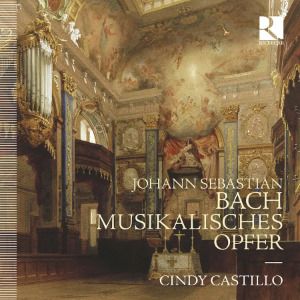
Johann Sebastian Bach (1685-1750)
Musikalisches Opfer, BWV 1079 (1747)
Cindy Castillo (organ)
rec. April 2024, Église Saint-Loup, Namur, France
Ricercar RIC472 [64]
At the back of my mind, I have always thought of Bach’s Musikalisches Opfer [A Musical Offering] as an academic work. It might be an “Everest” in technique but it lacked a sense of enjoyment and pleasure, and, dare I say, cohesion. In fact, I would have agreed with Hubert Parry that it “is not of very great musical interest, but its general interest in connection with the personality of the composer is supreme”. This disc has allowed me to see the masterpiece in a different light that has given me a new enthusiasm for it. Up until this release my go-to edition was Karl Richter’s 1963 recording on the Archiv label (reissued as a part of the magnificent 1975 “complete” edition).
The story of the creation, performance and interpretation of the work is a little convoluted, to say the least. Essentially, it is a series of canons and ricercares (an early type of fugue) based on a single theme. Whilst Bach was visiting his son Carl Philip Emanuel, Kapellmeister at the court of Frederick the Great, the monarch invited Bach père to his palace in Potsdam, where he showed the composer a theme that he had devised. Asked to improvise a six-part fugue on this subject, Bach declined but immediately invent a three-part fugue instead. On returning home, he decided to revisit the theme, and created a large-scale work which did indeed include a six-part ricercare or fugue. It also contained a Trio Sonata originally scored for flute, violin and continuo. The score was duly engraved by Schübler and presented to Frederick. There have been several attempts at producing a definitive interpretation.
The advertising for this disc explains that – although scholars have solved the problem of instrumentation – there have been other “realisations”, including Anton Webern’s orchestration of the Ricercar a 6 and Leslie Howard’s 1990 orchestral version of the entire work. What is heard on this disc is organist Cindy Castillo’s take on A Musical Offering, which she has realized for her instrument. She has reimagined the work to mark the completion of the Dominique Thomas instrument in Église Saint-Loup, Namur. The organ has been rebuilt in the Baroque style prevalent in Saxony and Thuringia in Bach’s day.
The most important feature of this recording is the order of the movements. There have been various re-orderings, but it has been common for the canons to be played one after the other. This is what has always put me off this composition.
The record producer, Jérôme Lejeune, explains that they adopted “a very daring formula” which he suggests “will no doubt provoke a great number of reactions”. They created a “flow that integrates what appears to be irreconcilable elements”. This includes the Italian Sonata, the two ricercares, and the canons. They open the recital with the Ricercar a 3, and close it with the monumental Ricercar a 6. And then they split up the Sonata into its four discreet movements, interspersed with the canons acting as a “commentary” on the proceedings.
The sound quality is perfect, remarkably precise. The progress of the extraordinary counterpoint is crystal-clear. The registrations are often magical. Even the canons, which I have always regarded as dry and dusty, find their valued place in this restructuring.
Cindy Castillo is a distinguished artist, known for her innovative cross-genre performances combining organ music with dance, video and electronic music. She has won numerous awards, including first prize at the National Axion Classics competition. She has been an artist-in-residence at the Sapporo Concert Hall in Japan. Castillo teaches at the Higher Institute of Music and Pedagogy in Namur, and is the titular organist at the National Basilica of the Sacred Heart in Brussels.
The liner notes in English, German and French are in three parts, with a general introduction by Cindy Castillo and a discussion of the playing order by Jérôme Lejeune. There is a note on the instrument and the organ specification. No details of the organist are given.
A Musical Offering remains a testament to Bach’s ingenuity and his ability to transform a relatively simple musical idea into a profound, elaborate work. The present edition is set fair to make this Offering a more approachable and satisfying experience.
John France
Buying this recording via a link below generates revenue for MWI, which helps the site remain free



















